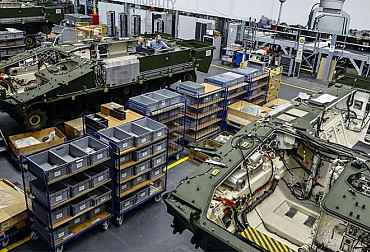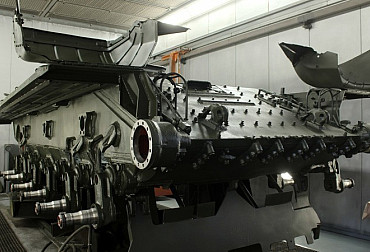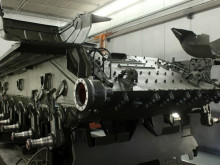Czech-Israeli defence cooperation is gaining importance
The Czech army is currently implementing a number of modernisation projects in cooperation with Czech companies and major foreign partners, which are supplying high-end weapon and electronic systems. Among the most important partners is the State of Israel, with Israeli companies cooperating mainly on the modernisation of air defence systems. However, they have much more to offer in the future.
The Czech Republic has traditionally had very good relations with Israel at the political and cultural level, but in addition to this, economic cooperation, foreign trade and, in recent years, defence cooperation have been strengthening. It is certainly worth remembering that the Czech Republic is Israel's most important trading partner in Central Europe, with a trade volume many times higher than that of Poland, Austria, Slovakia or Hungary. Moreover, the very good trade balance with Israel is still growing, with Czech exports to Israel increasing by CZK 4.2 billion and Israeli imports to the Czech Republic by CZK 2.2 billion last year alone, which shows that Czech companies are able to assert themselves on the demanding Israeli market and that Israeli companies, which are often among the world's top companies, have something to offer Czech customers.
The uniqueness of Czech-Israeli relations was recently underlined by the fifth joint meeting of the Czech and Israeli governments in Prague. Unfortunately, due to current events, this did not happen. However, the attack on Israel has once again demonstrated how important it is to invest in the defence capability and modernisation of the army. It is no coincidence that Israel has become a major partner in building modern air defence for the Czech Republic. What is more, the Israeli side not only supplies cutting-edge systems for the Czech armed forces, but also involves Czech companies and experts in the projects and transfers the necessary know-how to the Czech Republic.
At the end of 2019, the Czech government signed a contract for the purchase of eight Elta EL/M 2084 MMR radars of the MADR category to replace the long-standing Soviet systems, which should have been decommissioned by then. This was the first swallow that kicked off the long-delayed modernisation of Czech airspace protection. According to the contract, the manufacturer Elta Systems was to deliver the radars by this year. It fulfilled this commitment, although the implementation of the radars into the Czech army's command and control system, some of whose components are not up-to-date, was very challenging. However, the Israeli and Czech specialists managed to pull off the feat and integrate the modern radars into the Czech environment to the satisfaction of the Czech Army. Czech companies such as Retia from Pardubice, which was responsible for the production of some key components, and Tatra Trucks from Kopřivnice, which produced special chassis, were also involved in the production and delivery of the radars.

Other key systems that the Czech army will receive from Israel as part of the modernisation are Spyder air defence missile systems, including additional Elta EL/M 2084 radars. The contract was signed at the end of 2021, with all four batteries to be delivered by 2026. Czech companies will be involved in production and delivery, alongside state institutions such as the Military Technical Institute. The Spyder systems belong to the short-range category (SHORAD). It would thus be advisable to complement this system with medium- to long-range systems in the future. Here, another Israeli system, the Barak MX from Israel Aerospace Industries, which was recently chosen by Slovakia as a future pillar of its air defence, is proposed. The Barak MX is a proven system used by the Israeli military to defend Israeli territory from attacks by Palestinian extremists and has found its way to other countries as well. Moreover, it is compatible, like the Spyder system, with the Elta radars that the Army has already incorporated into its armament.

In addition to air defence, the Czech Army also needs to significantly improve its capabilities in the area of unmanned reconnaissance and long-range combat vehicles. Drones, which can perform long-term reconnaissance missions and also carry smart weapons and guided munitions, are not yet available to the Czech army. It has only small and mini tactical UAVs, suitable for smaller units. In the field of reconnaissance and combat drones, Israeli companies are among the world leaders, and it is not surprising that the Czech army has recently chosen the Heron 1 type in the latest specification as a new means of strategic reconnaissance and for combat deployment, which is effectively operated, for example, by the German Bundeswehr. Heron 1 is one of the most powerful medium-sized drones, which can undertake reconnaissance flights of tens of hours and provide important information and data in real time to various levels of command. It can also attack remote targets with precision weapons, even in areas where deploying conventional manned aircraft would be highly risky. While the Army's command has recently postponed the acquisition of these powerful UAVs until a later date, the experience of the war in Ukraine clearly shows that UAVs of this category have an indispensable role in modern conflicts.
The above-mentioned projects are proof that the very good relations between the Czech Republic and Israel are becoming more important than ever. "The potential of Czech-Israeli relations is far from being fulfilled, let alone exhausted. Their development depends not only on politicians, but also on businessmen, academic experts and students in both countries. Let us therefore continue to work on the continuation of the story, the first chapter of which was written by Tomáš Garrigue Masaryk himself during his visit to the future Israel in 1927. A story that shows that smaller democratic states can survive and prosper even in the most unfavourable conditions and that regardless of their size and population they can positively influence the whole world," says Pavel Smutný, President of the Czech-Israeli Joint Chamber of Commerce.
The Czech Republic is now focusing on domestic industry as well as partners from the European Union, the USA and Israel in the field of security and military modernisation, which is positive news. On the one hand, these are reliable partners with high-end weapons systems, but it is also an appropriate diversification, as dependence on only one supplier could have a negative impact in the future.





















